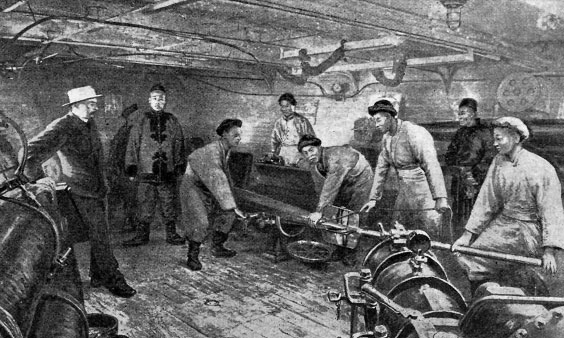

A foreign officer instructs soldiers of the Beiyang fleet on firing a torpedo during an exercise.
The Qing government later gave each of these foreign officers who sacrificed themselves three years' salary as pension to their families.
Learning from the West
Since the mid-19th century, China started to learn from the West to build a modern navy. Starting with preparations in 1875, the Beiyang fleet was commissioned by 1888 and became one of the strongest naval forces in Asia.
China imported the most advanced battleship and weapons from Europe but had insufficient experience, naval professionals and scientific knowledge to navigate this huge modern fleet. In 1881, Ding Ruchang, a Chinese naval officer who became commander of the fleet, brought two battleships from the British city of Newcastle, but could not find anyone in China who knew how to operate the vessels' 10-inch guns.
According to Chen Yue, the naval historian, foreign officers were mostly from Britain, which was the strongest maritime power at that time. Officers also came from France, Germany and the US.
In return, the Chinese government offered attractive salaries, which lured many low-income naval officers from abroad.
As a young graduate of the US naval academy, McGiffin was not able to join the US navy because of budget cuts. He headed to China for work and received a commission as a lieutenant from Li Hongzhang, with a monthly income of $100.
The good pay was also one of the reasons for Thomas Nicholls, a single father of two, to come to China.
Despite the help from the West, the Beiyang fleet was crushed. The defeat shook the regime of the Qing Dynasty, which ended 17 years after the war.
Copyright ©1999-2018
Chinanews.com. All rights reserved.
Reproduction in whole or in part without permission is prohibited.